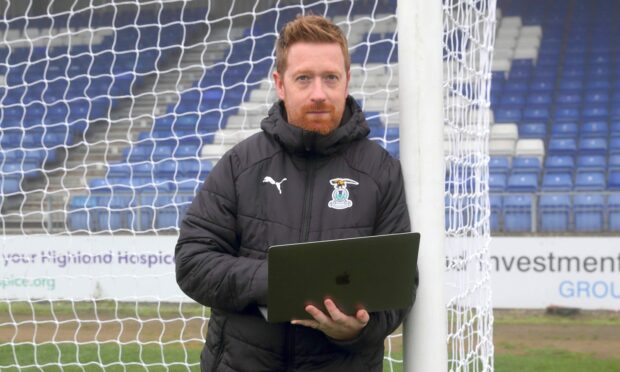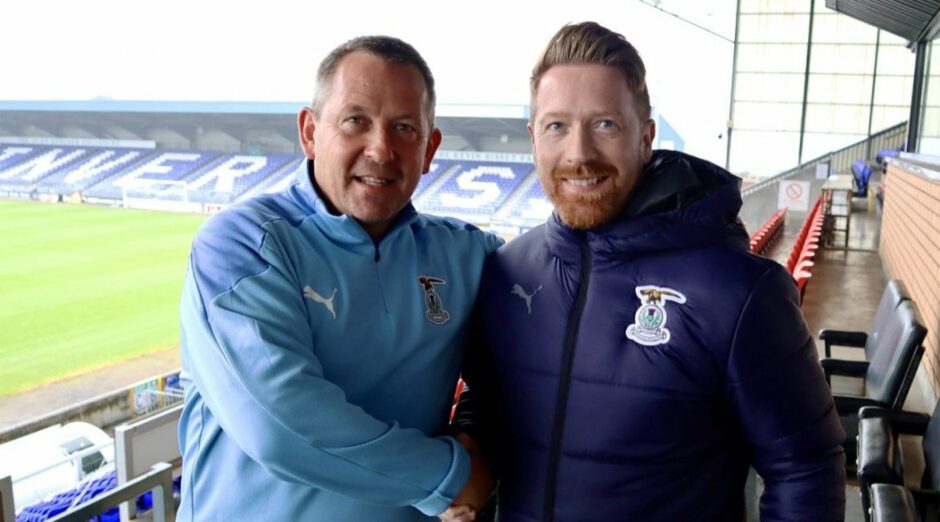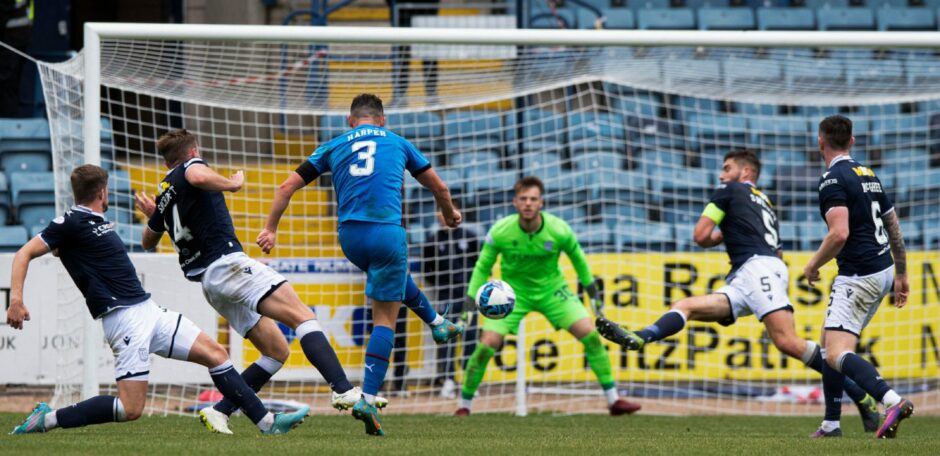Plotting to get the better of Caley Thistle’s opponents begins a good time before the first whistle.
It also happens not only on the touchline as the action unfolds on the pitch, but in the stands, master-minded by a key member of staff.
The club’s shrewd video analyst, Fraser Gorman, makes it his job to become head coach Billy Dodds’ “second brain” in order to know what he requires for preparation.
Although the 34-year-old primary school teacher was mainly brought in by Dodds to offer live details, which can be swiftly put into action in a match situation if the game might not be going to plan, for example.
Gorman was first lured to the Highlands in 2014 by then-Ross County manager Jim McIntyre and Dodds, who was his assistant.
As well as competing well within the Scottish Premiership, the Staggies clinched their first national trophy under the duo in the shape of the League Cup in 2016.
Dodds worked closely with Gorman at Dingwall and was determined to bring him to the Caledonian Stadium in the summer of 2021 when he took over the manager’s job.
A tight budget left the deal hanging. In came welding and pipeline specialist Serimax, whose base is in Evanton, Ross-shire.
More specifically, it was Serimax’s marketing and business development analyst Kevin Blyth, who knows Gorman well, who showed his faith by way of a sponsorship – which kicked off last year and has continued into this season.
Sponsorship works for both parties
Gorman believes the shared goal of driving the Highlanders back to the Premiership for the first time since 2017 was at the heart of the agreement between Inverness, Serimax and himself.
He said: “It has been unbelievable and Serimax just let us do what we need to do.
“They, as a company, just want to see Caley Thistle become a Premiership club again. If that happens, it gives them more exposure, so from a business point of view, it makes perfect sense.
“They have built up a really good relationship with the club, so it has worked out well.”
Journey began at Hamilton Accies
Inverness are one of six Championship clubs with an analyst, the others being, of course, McIntyre’s Cove Rangers, Raith Rovers, Hamilton, Dundee and Ayr United.
Dodds is the latest manager to bring Gorman on board. The first was Billy Reid, who is now assistant to Graham Potter at Chelsea.
Reid was impressing in charge of Hamilton and Gorman secured a one-year internship at Accies when studying his sports degree at the town’s University of the West of Scotland.
His lecturer, Mark McKenna, coached Accies’ women’s side and also delved into football analysis, sparking an interest for Gorman, who sets the scene of the early path into football analysis, which was a module within his degree.
He said: “Billy Reid was the manager at that point and Andy Boles was the sports scientist and he was a great person for me to learn from.
“Andy, who moved on to be head of sport at Middlesbrough, knew about analysis and showed me his work and asked me to run with it and I done it for a year.
“The team were relatively successful that year, although they didn’t get promoted (to the Premiership).”
A fan to analyst with Partick Thistle
Gorman, a fan of Partick Thistle, then caught the attention of the Jags and was soon making a switch between clubs.
He said: “We played Partick Thistle on the last day of the season and Jackie McNamara was the manager there.
“He saw me with the laptop and saw what I was doing. He asked me to come to Firhill on the Monday for a chat.
“I had graduated from university and had done my year at Hamilton.
“As a Partick Thistle fan, it was great as Jackie asked me to come and join Thistle for the season – but he left in the January to go to Dundee United and Alan Archibald took over, while still being a player.
“The team were going really well. Alan took over and we ultimately got promoted, which was fantastic.
“As a fan, you sit in the stand and wish you could be part of it. To be at the club when it was promoted was excellent.
“I stayed on for a year in the Premiership when we managed to secure safety.”
Life-changing call from Dingwall
Ross County had an analyst called Ian Mackinnon, who doubled as kitman under Derek Adams.
When McIntyre and Dodds came in, the manager wanted a full-time specialist in the subject and Mackinnon passed on Gorman’s number, having seen him in action when Thistle had played County.
The call from County came out of the blue and at a critical point in Gorman’s life.
He explained: “I got a call from Jim McIntyre out of nowhere.
“Ian left the club, but passed my number on to Jim, who called me and invited me up.
“At that point, I felt it was a life-changer. I lived in Glasgow and I had just lost my mum and I was unsure about leaving my dad.
“Jim’s call was on the Saturday to ask if I’d be interested to come up to chat to him, but he needed me to be up on the Monday.
“I came up and he showed me around, sold me the vision, but said he needed to know whether I’d join that night. I spoke to my dad, who urged me to go for it.
“Within a week, my life had changed from being in Glasgow – I left Partick Thistle with all their best wishes – and that is when my life as an analyst began, under Jim and Billy Dodds at Ross County.”
Specific video clips at touch of button
So, how does it work?
As well as using Wyscout, a system which uploads all the games for analysts, Gorman detailed a recent example of how another tool at his disposal can have swift, effective outcomes.
He said: “The software we use is called Sportscode. Most Premiership clubs use it and the Premier League clubs in England use it.
“I have a coding set with the manager and it ranges from goalkeeper distribution to the back three or four in possession, or playing through the thirds.
“When something happens in a game, I’ll code that and the computer processes it.
“At the end of 90 minutes, we have between 300-400 clips.
“We might not look at 90% of those clips, but they are available.
“Take a throw-in, for example. We noticed in a recent game, the set-up for throw-ins against (us) wasn’t the way the manager wanted it.
“We’ve got a button for throw-ins, so at half-time, we could quickly get all the throw-ins against and put them into a package and show the players what we’re talking about.
“You might never use the throw-ins again for the rest of the season – but it’s there.
“On a matchday, I can process these in real-time. I’m connected to the dugout with my earpiece and we can talk back and forth to get that message down to the pitch.”
Roy Hodgson’s seal of approval for analysts
People might not be aware of what an analyst does and how they fit into football clubs,.
Gorman recalls seeing a former England boss chop down any doubters about what the role played by analysts.
He said: “I remember being at a conference in Leicester and Roy Hodgson was the England manager. He had his analyst with him.
“People were chucking questions at (the analyst), asking what badges he had and how long he was spending on the training ground, almost trying to undermine his job.
“Roy Hodgson’s reply was he didn’t need his analyst to be out on the training pitch. He said if his analyst knows exactly the way he wants to play football, he’s the best in the world.
“I made it my job to listen and observe Jim (McIntyre) and Billy (Dodds) as much as I could. I would listen to their instructions (to the players) or their game-plans.
“When I went in to work on the video, I could cut it up exactly how they wanted it to be.
“I almost became a second brain of theirs.”
Analysis and teaching roles combine well
Gorman has a split love, for teaching and football analysis, and that divides his work-time.
He reckons the two roles work nicely side by side.
He added: “I’m a primary school teacher, so I am a part-time (analyst) in terms of the hours I’m actually at the club.
“But I’m full-time in terms of getting what the manager needs quickly and that comes down to knowing how he wants to play.
“It’s really easy for me to watch a team and spot something that might cause us a problem, or I can see a way we could play (an aspect) against an opponent.
“It means when I go into my meeting with the manager, I know what I’ll be showing him. I love these conversations where we’re working towards the game goal.
“That’s especially so at a club like Inverness where everyone is doing two or three jobs. I love that ethos – everyone chips in.
“I do hours of work at home and tying that into teaching can be tough, but going into teaching was good for me. There are actually a lot of similarities.
“I teach in the Black Isle and many of the teachers have been invested in this (job) with me, in terms of coming to games.
“I’d like to think I can help out the community a wee bit in terms of identifying schoolkids maybe otherwise not spotted.
“There are positives coming from me, dove-tailing both jobs.”
Opponents studied in fine detail
And Gorman said the current technology, in its rapid analysis of Caley Thistle’s own performances, allows him to use most of his time learning about Inverness’ opponents – knowledge he can then pass on to the management.
He said: “A lot of teams have an opposition analyst and an analyst for their own side.
“When you’re a one-man band, that can be time-consuming.
“Usually, we’ll look at our opponents’ last three games. That will give you a good idea, unless there has been a change of manager.
“In that case, you’d go back to that manager’s last team and consider if there’s a chance he might set up that way against us.
“Because I know what the manager is looking for, I can get through those games relatively quickly.
“I’ll spend four to five hours per week looking at the opposition. The software is processing our game in real-time, by the full-time whistle this game is done.
“You would spend more hours on something if the manager wants to show the players a specific aspect. We will then tie in on a Sunday and put that into a quick presentation and he can show the players.
“I spend more of my time looking at the opposition, because our own team can be done quickly.”
The final word then goes to Dodds, who clearly values what Gorman brings to his staff.
He said when the appointment was made: “Having worked with Fraser previously, I knew the unique skillset he could bring to the club and I believe the new analytical software programmes in which he specialises will prove to be invaluable for us.”








Conversation